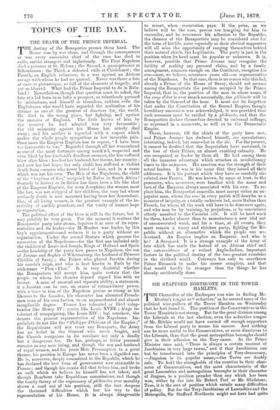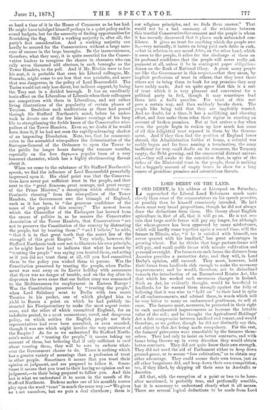SIR STAFFORD NORTHCOTE IN THE TOWER HAMLETS.
THE Chancellor of the Exchequer was wise in finding Mr. Ritchie's tongue as" seductive," as he assured some of the political wire-pullers of the Tower Hamlets on Wednesday that he had found it. The position of the Conservatives in the Tower Hamlets is not strong. But for the great division among the Liberals at the last election, even the seductive tongue of Mr. Ritchie would not have carried off enough supporters from the Liberal party to secure his success. And nothing can be more useful to the Conservatives, or more disastrous to the Liberals, than that the great metropolitan boroughs should give in their adhesion to the Tory cause. As the Prime Minister once said, "There is always a certain amount of Jacobinism in very large towns," and if that Jacobinism can but be transformed into the principles of Tory-democracy, —Jingoism is its popular name,—the Tories are doubly safe. To hold the strongholds of the counties in their char- acter of Conservatives, and the most characteristic of the great Lancashire and metropolitan boroughs in their character of Jingoes, is a position prouder than any which has been won, either by the late Sir Robert Peel or Mr. Gladstone. True, it is the sort of position which entails many difficulties of policy. But for the Tory-Jacobinism of Lancashire and the Metropolis, Sir Stafford Northeote might not have had quite.
so hard a time of it in the House of Commons as he has had. He might have indulged himself perhaps in a quiet policy and in sound budgets, but for the necessity of finding opportunities for flourishing the flag. Still a working majority is, after all, the party's first consideration. And a working majority can hardly be secured for the Conservatives without a large mea- sure of success in the large boroughs. Be the inconveniences, therefore, what they may, it is quite essential for the Conser- vative leaders to recognise the charm in charmers who can rally seven thousand odd electors, in such boroughs as the Tower Hamlets, to the poll. And if Mr. Ritchie were to lose his seat, it is probable that even his Liberal colleague, Mr. Samuda, might come to see less that was patriotic, and more that was dangerous, in the policy of Lord Beaconsfield. The Tories would not only lose direct, but indirect support, by losing the Tory seat in a divided borough. It has an excellently tonic effect on the Liberalism of Liberals when their colleagues are competitors with them in Liberalism, and not rather living illustrations of the popularity of certain phases of Toryism. Doubtless such meditations as these had passed through Sir Stafford Northcote's mind, before he under- took to devote one of the few leisure evenings of his busy life to strengthening the feeble knees of the Conservative wire- pullers of the Tower Hamlets. Even so, we doubt if he would have done it, if he had not seen the rapidly-advancing shadow of an impending Dissolution. Note, too, that he communi- cates to the assembled wire-pullers the determination of the Surveyor-General of the Ordnance to open the Tower to the public for longer hours during the summer months, especially on the free days,—a popular boon of a very innocent character, which has a highly electioneering flavour about it.
When we come to the substance of Sir Stafford Northcote's speech, we find the influence of Lord Beaconsfield powerfully impressed upon it. His chief point was that the Conserva- tives have never put sufficient trust in the people, and that next to the " great firmness, great courage, and great energy of the Prime Minister," a description which elicited " en- thusiastic cheering" from the wire-pullers of the Tower Hamlets, the Government owe the triumph of England, such as it has been, to " the generous confidence of the mass of the people of this country." The newest lesson which the Chancellor of the Exchequer has learned from the course of politics is, as he assures the Conservative Association of the Tower Hamlets, that Conservatives " are not to preserve the Constitution of the country by distrusting the people, but by trusting them ;" "and I believe," he adds, " that it is in that great truth that the secret lies of the strength of this great Empire." Very wisely, however, Sir Stafford Northcote took care not to illustrate his own principle, or he might have had to indicate that what he meant by " ti usting the people " was saying you trusted them, and acting as if you did net trust them at all, till you had committed them to the policy you wished them to pursue. Was the Constitution preserved by trusting the people, when Parlia- ment was sent away on its Easter holiday with assurances that there was no danger of trouble, and on the day after its dispersion the news came that our Indian army was summoned to the Mediterranean for employment in Eastern Europe ? Was the Constitution preserved by " trusting the people," when Lord Salisbury went to Berlin with two secret Treaties in his pocket, one of which pledged him to yield to Russia a point on which he had publicly in- structed his Plenipotentiary to make the most urgent resist- ance, and the other of which committed England, for an indefinite period, to a mast momentous, novel, and dangerous policy, on which neither the English people nor their representatives had ever been consulted, or even sounded, though it was one which might involve the very existence of the Empire ? As far as we understand Sir Stafford North- cote's notion of " trusting the people," it means taking no account of them, but believing that if only sufficient is 'aid
about trusting them, they will be sure to endorse what- ever the Government choose to do. There is nothing which has a greater variety of meanings than a profession of trust in other people. Sometimes it means that you trust their opinion or judgment, and are prepared to follow it. Some- times it means that you trust to their having no opinion and no judgment,—to their being prepared to follow you. And this last is what we understand it to mean in the mouth of Sir Stafford Northcote. Dickens makes one of his monthly nurses play upon the word "trust" in much the same way :—" We gives no trust ourselves, but we puts a deal elsewhere ; them is
our religious principles, and we finds them answer." That would not be a bad summary of the relations between this trustful Conservative Government and the people in whom it has recently discovered that it places such unbounded con- fidence. It gives no trust for anything which the people owe it,—very naturally, it insists on being paid such debts in cash, —but in relation to any moral debts, on the other hand, which it owes to the people, it relies for the discharge of these on its profound confidence that the people will never really ask payment at all, unless it be in contingent paper obligations drawn on the Bank of National Glory. A great many people are like the Government in this respect,—that they mean, by implicit professions of trust in others, that they trust those others not to bring them to book for any promises they may have rashly made. And we quite agree that this is a sort of trust which it is very pleasant and convenient for a political party to feel, though it may sometimes lead them into a fool's paradise. For trust of this sort goes a certain way, and then suddenly breaks down. The people like being told that they are implicitly trusted. And no doubt, for a time, it has a mollifying and cheering effect, and does make them relax their rigour in exacting an account of broken promises. But at last arrives a day when even the people begin to reckon up how much has come of all this delightful trust reposed in them by the Govern- ment. And if they then find the position of England lower abroad, the Administration feebler at home, a colonial war rashly begun and far from nearing a termination, the army inefficient for very small drafts on its resources, the Treasury empty, the Debt growing, and the commercial distrust univer- sat—they will awake to the conviction that, in spite of the riches of the Ministerial trust in the people, there is nothing but a beggarly account of empty boxes to show for a long course of grandiose promises and ostentatious threats.



































 Previous page
Previous page